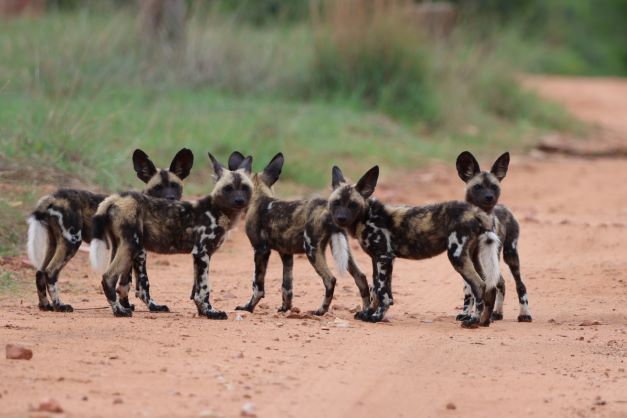Mabula’s newly established wild dog pack going strong

Follow the incredible story of how the Greater Mabula Private Game Reserve in the Waterberg became the closest reserve to Gauteng providing sanctuary to South Africa’s endangered African Wild Dogs with the unexpected arrival of two male dogs on the reserve which have now been matched with two suitable females.
In January 2022, in collaboration with the Endangered Wildlife Trust and the Waterberg Wild Dog Initiative, two females were identified from the free-roaming Waterberg wild dog population and translocated to the reserve. The four dogs were then kept in a holding boma for a few weeks to facilitate social bonding before their release in May 2022.
Consisting of two females and two males, the Mabula pack is only the second known breeding pack of African wild dogs in the Waterberg.
The dogs began denning in the southwestern section of the Reserve in early July 2022, with the alpha female giving birth to two pups. However, sadly, one disappeared at around 12 weeks old. The beta female has also given birth to five pups. There are currently six pups with the pack, according to reports conducted in November 2022.
The Greater Mabula Private Game Reserve has recently replaced a GPS tracking device on one of the males in the pack for monitoring, research, and security purposes.
With the assistance of the Mabula Reserve ecology and management teams, Andy Fraser, a wildlife vet from Rooiberg who is familiar with the reserve and helps with most of the reserve management interventions, was able to locate and dart the alpha male. This immobilised the dog for about an hour so the team could safely get to work.
Under his supervision, the old tracking collar was duly removed and carefully replaced with a new device. At the same time, he was able to examine examined the dog, administer various vaccines, and collect DNA samples required for scientific analysis.
Once the work was completed, a reversal drug was injected to mobilise the dog again. From a distance, the group was then able to monitor his recovery and watch as he joined up with the pack again.
Fraser says he was pleased with the condition of the alpha dog and confirms that the pack will add great diversity to the 125 square kilometre reserve, filling a vacant niche.
“The Waterberg population is an extremely important one as it is one of the country’s last remaining packs of free-roaming dogs, which means they enter and leave the area naturally,” says Reilly Mooney, Project Coordinator of the Waterberg Wild Dog Initiative (WWDI).
